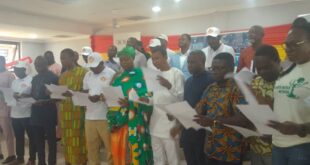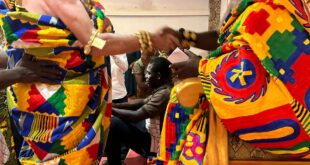The fictional country was recently used in a series of prophecies
Police had issued a directive against doom prophecies late last year
“Umuofia” has trended on Ghana’s social media landscape since last Friday, December 31, 2021, when it was used extensively in prophetic ministration by Nigel Gaisie of the Prophetic Hill Chapel.
Originally known to be a town in Nigeria, one popularized by Chinua Achebe in his acclaimed classical novel ‘Things Fall Apart,’ Gaisie’s use of the town in prophesying has made the town largely the butt of jokes.
From people posting purported flags and passport covers of the said town, which Gaisie described as a country, to others promising to vacation in Umuofia while for others, the country is synonymous to Ghana.
It is largely believed that the prophet opted for ‘coded’ prophesying because of a December 27, 2021, Police statement that cautioned against prophecies that could create ‘fear and panic.’
When the regional Public Relations boss of the Ghana Police Service appeared on Adom FM’s Dwaso Nsem programme on Tuesday, January 4, 2022, he was asked about Umuofia.
Supt. Alexander Obeng replied: “Please what is it? Here in Ghana, I kmow towns like Kunkumbonge, Bandare, Tsaatse, Bole, we have others like Sogakope, Bawakuraa. These are towns that I happen to know. But (Umuofia) in Ghana here, I don’t know about that,” he stressed.
When asked about Nigel Gaisie’s prophecy, the top cop instead explained the work done by himself and Inspector-General of Police, George Akuffo Dampare by way of extensive patrols from New Year’s Eve into the year 2022.
After listing several locations, he said: “The town you mentioned is not among the areas we covered is not in Ghana, or is that not so, so if someone does something outside Ghana, I can’t tell.
“I don’t know but what is important is that all the prophets complied with the law. I am also happy that among faith-based organizations, groups advised one another, it was most important,” Supt. Obeng stated.
The Ghana Police Service on December 27 issued a statement, prompting prophets on the need not to make prophecies that cause ‘fear and panic.’
“We want to caution that under Ghanaian law, it is a crime for a person to publish or reproduce a statement, rumour or report which is likely to cause fear and alarm to the public or to disturb the public peace, where that person has no evidence to prove that the statement, rumour or report is true.”
“It is also a crime for a person, by means of electronic communications service, to knowingly send a communication that is false or misleading and likely to prejudice the efficiency of life-saving service or to endanger the safety of any person,” the statement added.
 Home Of Ghana News Ghana News, Entertainment And More
Home Of Ghana News Ghana News, Entertainment And More





